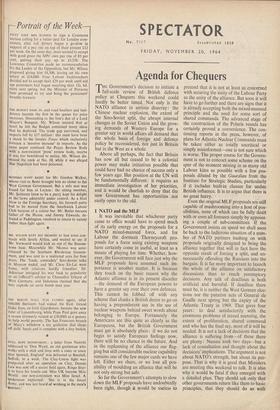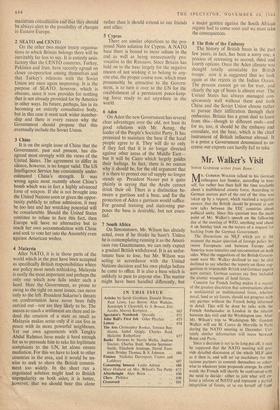Agenda for Chequers
THE Government's decision to initiate a full-scale review of British defence policy at Chequers this weekend could hardly be better timed. Not only is the NATO alliance in serious disarray: the Chinese nuclear explosion, the extent of the Sino-Soviet split, the abrupt internal changes in the Soviet Union and the grow- ing demands of Western Europe for a greater say in world affairs all demand that the whole basis of foreign and defence policy be reconsidered, not just in Britain but in the West as a whole.
Above all perhaps, the fact that Britain has now all but ceased to be a colonial power may make initiatives possible that could have had no chance of success only a few years ago. Her position at the UN will be fundamentally different: it requires an immediate investigation of her priorities, and it would be churlish to deny that the new Government has opportunities . not easily open to the old.
1 NATO and the MLF It was inevitable that whichever party came to office would have to spend much of its early energy on the proposals for a NATO mixed-manned force, and for Labour the dormant Thorneycroft pro- posals for a force using existing weapons have certainly come in useful, at least as a means of playing for time. Whether, how- ever, the Government will face just why the • MLF proposals have assumed such im- portance is another matter. It is because they touch on the basic reason why the Atlantic alliance is in its present disorder —the demand of the European powers to have a greater say over their own defences. This cannot be fobbed off with any scheme that cloaks a British desire to go on having a preponderant say in the use of nuclear weapons behind sweet words about belonging to Europe. Fortunately the .Americans see this quite as clearly as the Europeans, but the British Government must get it absolutely plain : if we do not begin to satisfy European feelings now, there will be no chance in the future. And in the replanning of the alliance our flag- ging but still Considerable nuclear capability remains one of the few major cards we have left. Either we share, or we lose all pos- sibility of moulding an alliance that will be not only strong but safe.
So far the Government's attempts to slow down the MLF proposals have undoubtedly been right, though it would be useless to pretend that it is not at least as concerned with securing the unity of the Labour Party as the unity of the alliance. But soon it will have to go further and there are signs that it is already accepting both the mixed-manned principle and the need for some sort of shared commands. The advanced stage of the construction of the Polaris vessels has certainly proved a convenience. The con- tinuing reports in the press, however, of plans for Atlantic Nuclear COmmands must be taken either as totally uncritical or simply misinformed—one is not sure which is worse. The proper course for the Govern- ment is not to concoct some scheme on the spur of the moment mixing in as many old Labour kites as possible with a few pro- posals diluted by the Guardian from the Institute for Strategic Studies, particularly if it includes built-in clauses for undue British influence. It is to argue that there is no great hurry.
Even the original MLF proposals are still capable of mushrooming into a host of pos- sibilities, none of which can be fully dealt with or even all foreseen simply by appoint- ing a couple of sub-committees. If the Government insists on speed we shall soon be back to the ludicrous situation of a num- ber of NATO partners bashing on with proposals originally designed to bring the alliance together that will in fact have the opposite result of forcing a split, and un- necessar4 offending the Russians into the bargain. It is far more important to launch the whole of the alliance on satisfactory discussions than to reach peremptory decisions. Any talk of deadlines is both artificial and harmful. If deadline there must be, it is neither the West German elec- tions nor the putative acts of General de Gaulle next spring but the expiry of the Atlantic Treaty in 1969. That gives four years: to deal satisfactorily with the. enormous problems of mixed manning, the extent of proliferation, shared command and who has the final say, most of it will be needed. It is not a lack of decisions that the alliance is suffering from—of these there are plenty : Nassau took two days—but a lack of consultation and thought about the decisions' implications. The argument is not about NATO's strength, but about its pur- pose. That is why it is good that Ministers are meeting this weekend to talk. It is also why it would be fatal if they emerged with a detailed plan. They should ask only that other governments return like them to basic principles, that they should do so with maiiithirn consultation and That they should be always alert to the possibility of changes in Eastern Europe.
2 SEATO and CENTO On the other two major treaty organisa- tions to which Britain belongs there will be inevitably far less to say. It is entirely satis- factory that the CENTO countries, Turkey, Pakistan and Iran, have recently agreed on closer co-operation among themselk es and that Turkey's relations with the Soviet Union are once again improving. It is the purpose of SEATO. however, which is obscure, since it now provides for nothing that is not already provided for by America in other ways. Its future, perhaps, lies in its becoming an entirely consultative body, but in this case it must seek wider member- ship and there is every reason why the Government should propose that this eventually include the Soyiet Union.
3 China It is on the single issue of China that the Government, past and present, has dis- agreed most strongly with the views of the United States. The agreement to differ in silence, however, is no longer valid. The US Intelligence Service has consistently under- estimated ' China's strength. It was wrong again most recently about China's bomb which was in fact a highly advanced form of weapon. If she is not brought into the United Nations soon or given the oppor- tunity publicly to refuse admission, it may be too late and her wrecking potential will be considerable. Should the United States continue to refuse to face this fact, then Europe will have no alternative but to reach her own accommodation with China and seek to vote her into the Assembly even against American wishes.
4 Malaysia After NATO, it is in those parts of the world which in the past have been accepted as specifically British responsibilities where our policy most needs rethinking. Malaysia is easily the most important and perhaps the only one which now falls under such a head. Here the Government, so prone to swing to the right on most issues, can move only to the left. President Sukarno's threats on confrontation have never been fully carried out—nor are they likely to be. The means to reach a settlement are there and in- deed the creation of a state as small as Malaysia makes sense only if it can live in peace with its more powerful neighbours. Yet our own agreements with Tengku Abdul- Rahman have made it hard enough for us to persuade him to take his legitimate complaints to the UN, let alone ensure mediation. For this we have to look to other countries in the area, and it would be un- wise to seek to share the British commit- ment too widely. In the short run a negotiated solution might lead to British unpopularity on both sides; it is better, however, that we should bear this alone rather than it should extend to our friends and allies.
5 Cyprus There are similar objections to the pro- posed Nato solution for Cyprus. A NATO base there is bound to incur odium in the end as well as being unnecessarily pro- vocative to the Russians. Since Britain has held on to the base largely for the negative reason of not wishing it to belong to any- one else, the proper course now, which must presumably be attractive to the Govern- ment, is to turn it over to the UN for the establishment of a permanent peace-keep- ing force ready to act anywhere in the world.
6 Aden On Aden the new Government has several clear advantages over the old, not least its good relations with Mr. Asnag, the leader of the People's Socialist Party. It has promised to maintain the base if the local people agree to it. They will do so only if they feel that it is no longer directed against other areas of the .Middle East— but it will be Cairo which largely guides their feelings. In fact, there is no reason Why it should be, for the old argument that it is there to protect our oil supply no longer stands up. President Nasser put it quite plainly in saying that the Arabs cannot drink their oil. There is a distinction be- tween a garrison and a base, and for the protection of Aden a garrison would suffice. For general training and stationing pur- poses the base is desirable, but not essen- tial.
7 South Africa On Simonstown, Mr. Wilson has already acted, even if he thinks he hasn't. Unless he is contemplating running it as the Ameri- cans run Guantanamo, We can only expect a gradual British withdrawal. It is an unfor- tunate base to lose, but Mr. Wilson was acting in accordance with the United Nations decision and his own pledge before he came to office. It is also a base which is unlikely to pass to anyone else. The matter night have been handled differently, but a major gesture against the South African regime had to come soon and we must take the consequences.
8 The Role of the Embassy The history of British bases in the past few years, in fact, has been a sorry one, a process of retreating to second, third and fourth options. Once the Aden climate was thought totally unsuitable for British troops : now it is suggested that we look again at the rejects in the Indian Ocean. The process cannot go on for ever, and clearly the age of bases is almost over. The United States has always managed con- spicuously well without them and both China and the Soviet Union choose rather to pursue their infiltration through their embassies. Britain has a great deal to learn from this—though to different ends—and for us, too, it should be the embassy and consulate, not the base, which is the chief instrument of British influence abroad. It is a point a Government determined to in- crease our exports can hardly fail to take.



































 Previous page
Previous page